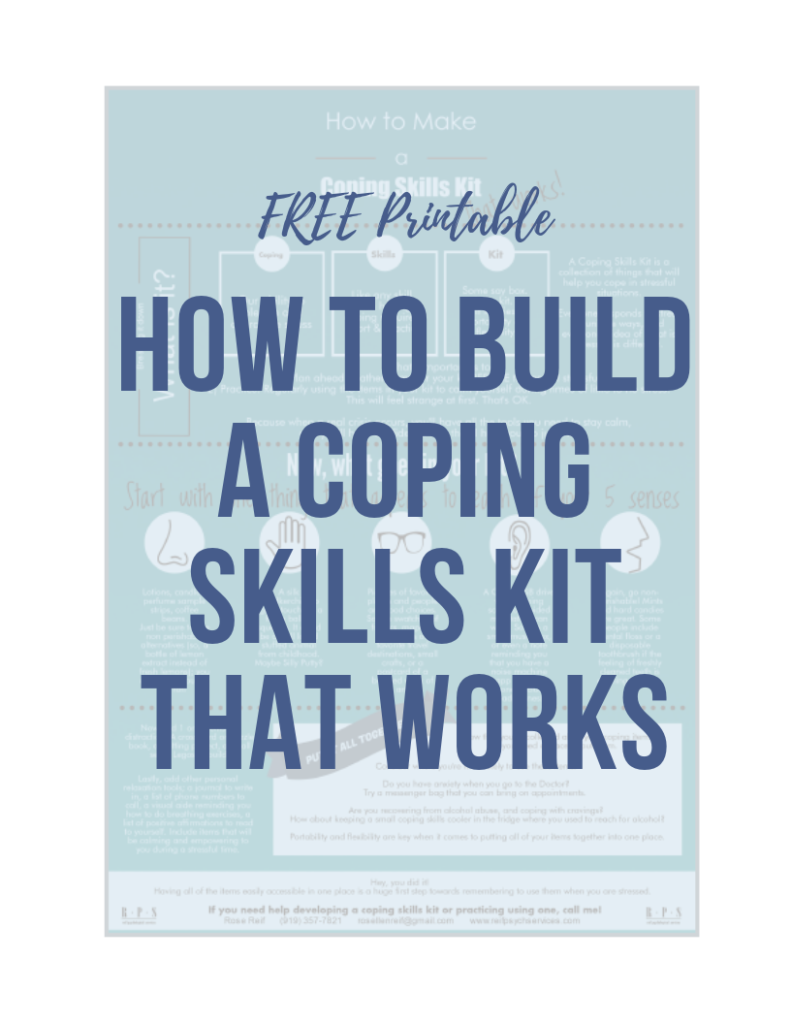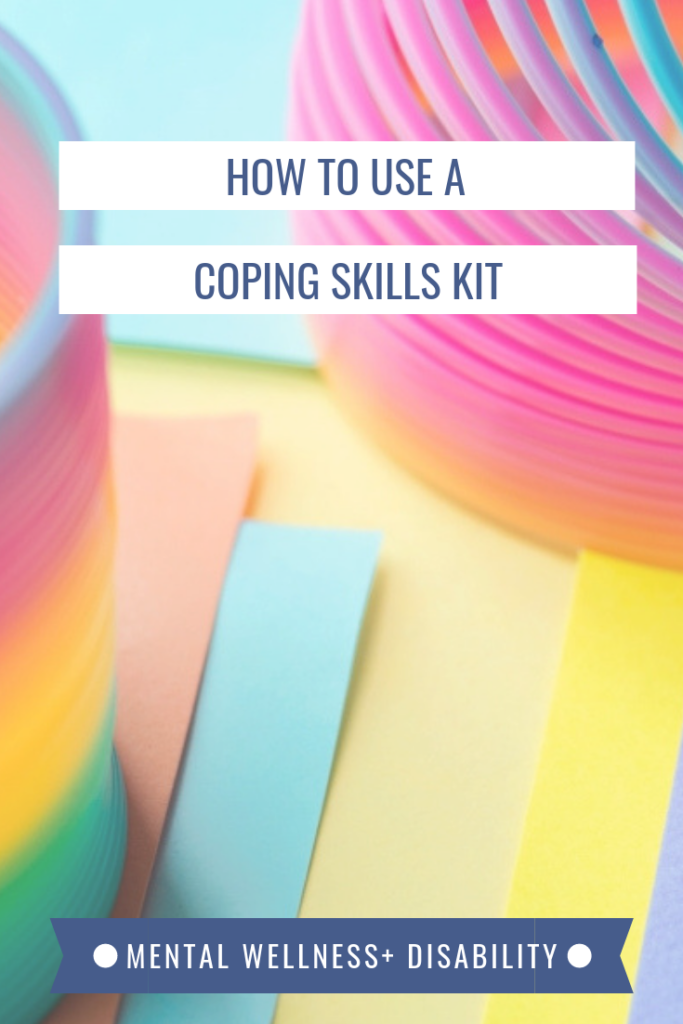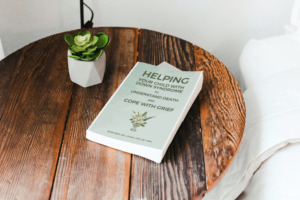What is a Coping Skills Kit?
A Coping Skills Kit is just a collection of items that are calming to you in times of distress. I often suggest a Kit for my counseling clients who have Intellectual and Developmental Disabilities who are also struggling with anxiety.
What makes a Coping Skills Kit a tremendous asset in times of crisis is that:
- Everything it in is familiar to you (because what each person finds relaxing is very different!)
- You’ve gathered everything you need together before a crisis
This post is about HOW to begin and get good at using a Coping Skills Kit that you’ve already put together.
Here’s a free, printable guide to building a coping skills kit.  A Coping Skills kit should include items that engage each of your five senses. It should also include guidance for what to do in a mental health emergency. Most importantly, the kit should be portable and easy to access.
A Coping Skills kit should include items that engage each of your five senses. It should also include guidance for what to do in a mental health emergency. Most importantly, the kit should be portable and easy to access.
Practice, practice, practice
Now that you’ve built a Kit that works, it’s time to start using it…kind of.
The biggest mistake that people make when using a Coping Skills Kit is that they expect the Kit will work immediately.
Sometimes people build a Kit, and then don’t look at it again until they are in crisis. They grab their Coping Skills Kit, dust it off, and then are frustrated when it doesn’t have a relaxing effect.
For a Coping Skills Kit to work, it needs to be extremely familiar to you. You need to trust that it will work, even in tough times.
My counseling clients get so sick of hearing me say this, but the ability to relax and cope in a situation that you perceive to be a crisis is a skill. Like playing the piano, speaking Mandarin, driving a car, or any other skill worth having, it takes practice.
Practice increases your skills AND your confidence in your skills.
When to practice using your Coping Skills Kit
I usually recommend that clients practice using their Kit around 8 times a day, in a variety of settings.
They usually look at me like I’ve lost my mind when I suggest this!
I get it. That’s a lot of times per day to drop what you’re doing and do anything!
I encourage my counseling clients with disabilities to think about it like this. On average, it takes about 5 minutes to practice using every item in your Coping Skills Kit; it may take more in the beginning as you’re getting used to things, but over time, it usually takes right around 5 minutes.
So, if you practice 8 times per day, that’s roughly 40 minutes of day that you’ll spend practicing the skill of relaxing and coping in stressful situations.
Most of my clients are willing to spend 40 minutes a day learning to combat stress by being ready for it They realize that it’s better than spending that long or longer being agitated, worried, or scared by stressful situations. They see that spending the time learning to calm themselves is a much better use of their time than being upset and not knowing how to deal with it.
There’s something else to consider when you’re thinking about when to practice using your Coping Skills Kit: your stress level.
In the beginning, you should only practice using a Coping Skills Kit when you are as calm as possible. That means you shouldn’t use it when:
- You’re worried about tomorrow’s visit to the dentist
- You feel sad that thinking about a loved one who died
- You’re so excited that your team just won the basketball game that you can hardly sit
Whether the emotions are negative or positive, the point is that the Coping Skills Kit should elicit calm and relaxation.
So, to help you coach your mind and body into achieving this calm every time you use the Kit, you should be calm as you first start to practice with the Kit.
How long the ‘practice’ phase lasts is really up to each individual. For most of my counseling clients who have Autism, Down syndrome, or other I/DD diagnoses, usually around 4-6 weeks of practicing 8 times per day with the Kit is sufficient.
I want to say again; I know that that sounds like an awfully long time to practice something that you’re not even positive will work.
Try to keep in mind that the extended practice is part of what makes this coping strategy work in times of legitimate crisis and meltdown.
To that end, it’s critical that everyone who supports you is ‘on board’. Don’t let anyone try to push for an early ‘test run’ with the Kit, no matter how extreme OR how minimal a crisis seems.
In those times, you should keep using any other coping or calming routines you’ve used in the past.
When you’re ready to start using your Coping Skills Kit in real times of stress
After some time, it will begin to feel like second nature, and probably even a little boring to use your Kit so often.
That’s exactly how it should be.
Once you reach the point where using the Kit really does come naturally, it’s time to start planning to use it in a time of minimal stress.
Maybe there’s an event coming up that you know will be stressful.
One client of mine knew she’d be getting back a grade on an important test. She’d studied and felt confident after the test, and so she believed she’d done well. But she still had some minimal anxiety around seeing her final grade.
We made a plan that she would use her Kit immediately prior to checking her grade.
Right as she logged on to the website to check her grade, I sat with her as I asked her to take note of physical sensations.
Even though she said she didn’t feel more than the tiniest bit of stress, she did notice that her palms were sweaty and her stomach felt a little queasy.
We made a note of this.
Then she used her Kit.
After using all of the items in her Kit, I again asked her to take note of physical sensations. Her palms were no longer sweaty, and most of her nausea had subsided. She said she did not feel anxious, and that she felt prepared to check her grade on the test, so, she did (and she’d done great!).
Over the coming weeks, she continued to practice using her Kit routinely. We continued to plan during counseling sessions times that she might want to use her Kit based on typical triggers for stress and anxiety.
Some ‘planned stress’ times that are great for practicing using Coping Skills Kits include:
- Before a test, performance, or sporting event
- Before or during medical or other appointment that causes anxiety
- During ‘waiting in line’ times
- Before an anxiety provoking conversation (maybe with a teacher, landlord, boss, parent, etc.)
- Before or during being in loud, crowded, or otherwise difficult sensory situations
- As part of a bedtime routine if falling to sleep is difficult, or during nighttime waking
After a few more weeks of practice and planned usage, you can start to use your Kit any time that you feel it will help you to stay or become calm.
Acknowledging that even the best Coping Skills Kit won’t work every time
I like to be really clear with my counseling clients that I don’t expect that their Coping Skills Kit will help them to become calm every time they are stressed or anxious or sad. I warn them that they shouldn’t expect this either.
Instead, during their practice phase, we spend a lot of time talking about times when their Kit might not work. We talk about extreme examples, such as if an immediate family member or beloved pet were to die.
We discuss that they will still be OK even if their Kit doesn’t seem to help some of the time.
Most importantly, we say that, even if the Kit doesn’t work every single time, if it works some of the time, it’s still worth trying.
Updating a Coping Skills Kit
I also encourage my clients to frequently reevaluate if everything in their Kit is still really working for them.
Maybe they’ve grown tired of the lemon extract scent. They decide to switch this out for a little jar of cinnamon sticks. Perhaps the silly putty is getting old and tough, and maybe trying a squeeze ball would be a nice change.
It makes sense that what a person finds relaxing will change as the person ages, maybe even from season to season.
Having a Kit that’s updated to meet your needs as they are now is a great first step. But because stressors and your responses to them will change over time, it’ll be important to keep your Kit updated.
If you know someone who might benefit from using a Coping Skills Kit, please use the social buttons to share this post with them!
Keep reading
Other posts you may be interested in
How to Know if Someone is a Real Friend. A Quiz for Teens and Adults with IDD.
In my counseling practice, I offer mental health counseling for teens and adults with IDD. Many of my clients who have Down syndrome, Cerebral palsy, and other disabilities have lots of meaningful friendships in their lives. But sometimes, they ask “how can I know if someone is a real friend?” Maybe you have a friend […]













